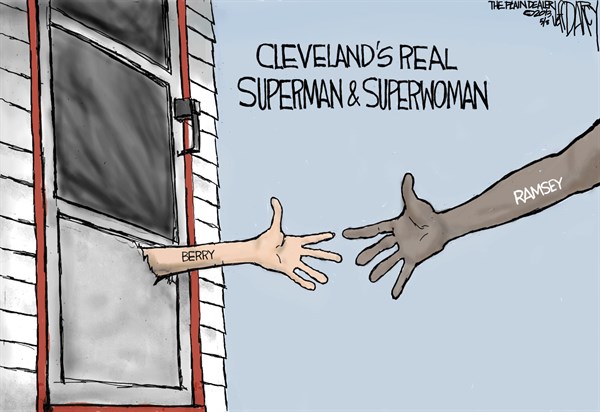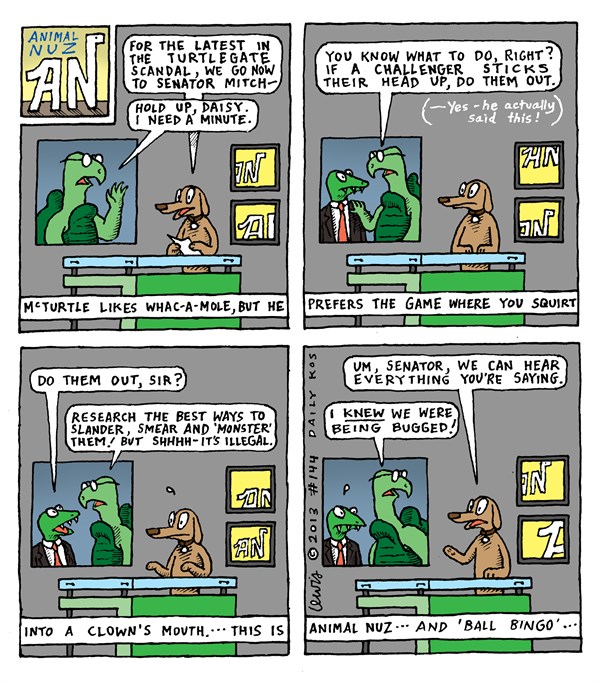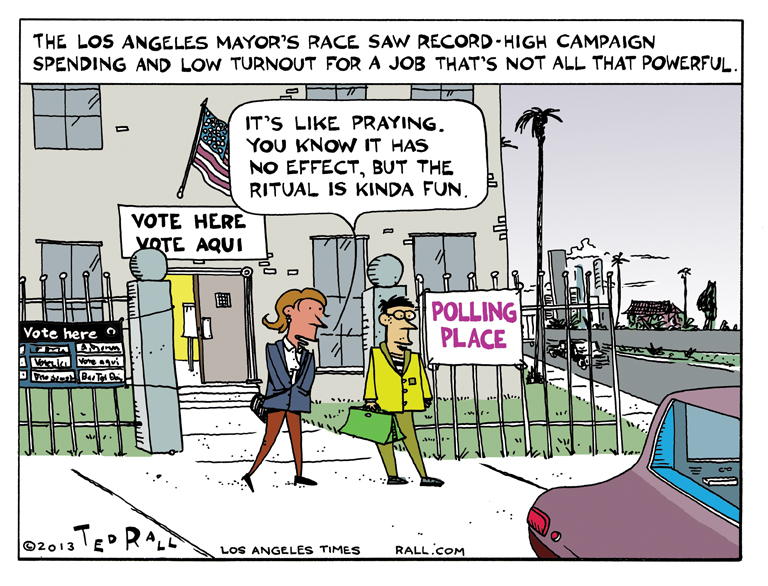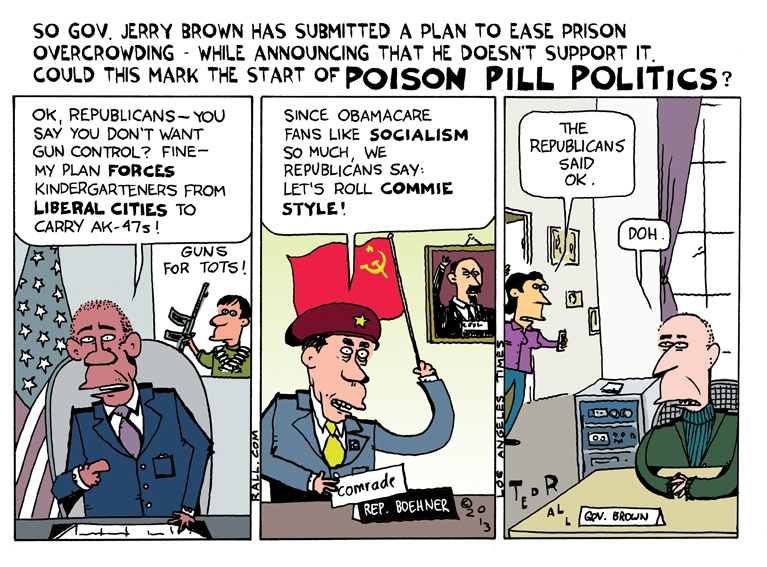Memorial Day: When Editorial Cartooning Comes Out to Die
No meme is stupider than “the troops died to protect our freedoms” – since the U.S. hasn’t fought a war that involved defending the U.S. since the 19th century, it would be more accurate to say that the troops died in order to crush other people’s freedoms – and that meme hits its zenith on Memorial Day, when the nation’s idea-challenged editorial cartoonists seize an opportunity to file a cartoon days in advance so they can kick off to the Bar-B-Q pit. Here are but a few of this year’s chestnuts of nastily nationalistic, sentimental pabulum:

First of all, the yellow ribbon is for live troops. You’re supposed to put it on your tree until they come home. I don’t think you’d put that in a cemetery – not unless you want them to come home and commit suicide. Which does happen a lot these days. (Also, on a side note: how did the original “Tie a Yellow Ribbon” song, which was about a convict hoping his lover would be there for him when he got out of the joint, get appropriated by the military industrial entertainment complex?)
The bigger point, of course, is that these dead men and women did not protect the U.S. since the U.S. has not been attacked by an invading army since, well, 1812. It merely reminds us of all the war and mayhem U.S. forces have caused all over the world – you know, places that are not lands of peace and freedom.
Not that the U.S. – where the FBI freely admits searching journalists’ files – is exactly a land of freedom. Or peace (see Newtown).
Sometimes a shitty cartoon can prompt a lot of thought.

A genuinely confusing cartoon. Knowing Beeler’s politics, I assume this is pro-war, but the tone is as sinister as WW2 propaganda art. Where are we, exactly?

Grateful for what? Dead soldiers? How does this “grateful nation” show its thanks – with a free flag?This kind of thing is soooo right-wing – and yet it draws no notice – that it gives me chills.

Aside from the mawkish sentiment, it’s pretty inaccurate. Military cemeteries, and military graves in civilian burial grounds, tend to be well-maintained.

McKee had to know – these guys all had to know – that other cartoonists would do this exact same cartoon. So why do it? The excuse used to be that their readers – in their paper – deserved their unique cut-and-paste take on a generic idea. But now with the Internet…why?

Zero.


Takeaway message: It is Memorial Day. Which I knew from looking at my calendar. Advice for Gorrell: Google Image Search high-res files when you’re looking for flags. I’m awed by this cartoon; it took him less time to make it than for me to read it.

Idiotic. But detailed. Them rocks look good for rock-climbing on a beautiful Memorial Day.

Apparently this sentiment does not apply to Afghans, Iraqis, Yemenis, Pakistanis, Somalis, etc.

When I first saw this, I thought it meant Electronic Benefit Transfer. Now that I understand it, I wanna know: do we owe these dead troops to China? Would they take them back? Having trouble with the analogy.

What, no rapists?

Check out this fascist art. See, Randy, one of the reasons I never enlisted is so that I don’t have to salute anyone. That is what freedom is really about.

Well, probably more conservatives. But you know, there are and were dead socialist soldiers. And communists. And Klansmen. And, for that matter, what about the non-Americans who were promised citizenship but died before they got it?
LOS ANGELES TIMES CARTOON: Mayoral Race Turnout
I draw cartoons for The Los Angeles Times about issues related to California and the Southland (metro Los Angeles).
This week: The Los Angeles Mayor’s race saw record-high campaign spending and low turnout for a job that’s not all that powerful.
SYNDICATED COLUMN: The Real Reason to Impeach Obama
Why Is the FBI Helping a Monstrous Dictator?
Forget the IRS, AP and Benghazi. The real scandal this week — the corrupt politicization of the nation’s top law enforcement agency — is President Obama’s decision to carry water for one of the world’s most evil dictators.
In a little-noticed move, Obama’s FBI has arrested Fazliddin Kurbanov, a 30-year-old Uzbekistani political dissident who, were this 1983, would be dubbed a “freedom fighter.”
Kurbanov faces the generic catchall charges used since 9/11 by the feds against low-level Islamists: conspiracy to provide material support to a foreign terrorist organization — in this case, the Islamic Movement of Uzbekistan (IMU) — and conspiracy to provide material support to (individual) terrorists. As usual, the “material support” charge doesn’t amount to much: the indictment alleges that he researched and made videos about how to make IEDs to use in Uzbekistan.
Major plot point: Kurbanov’s “terror plot” did not target the United States.
Nearly as important: the IMU is not at war with the U.S.
Originally based in rural Tajikistan and southern Kyrgyzstan, the IMU’s goal is to overthrow Uzbekistani President Islam Karimov, the most brutal of the dictators that have run the Central Asian republics since the collapse of the Soviet Union.
Karimov’s regime brooks no dissent: torture and murder of political opponents (and of businesspeople who refuse to pay bribes) is widespread. Officialdom is breathtakingly corrupt, sucking the oil- and gas-rich republic dry. Universally feared and reviled, Karimov is best known for boiling dissidents such as Mazafar Avazov and Khuzniddin Alimov to death (details and a gruesome photo of the 2002 boilings can be found in my book “Silk Road to Ruin: Is Central Asia the New Middle East?“), and for personally orchestrating the 2005 Andijon Massacre, in which at least 400 civilians were slaughtered by Uzbek security forces.
After Andijon, even the ethics-deficient Bush Administration decided that enough was enough, pulling U.S. forces out of Kashi-Khanabad airbase, which it had leased since 2001, and slashing military aid.
Which did nothing to rein in the tyrant. “The Uzbek constitution imposes a two-term limit, but Karimov was elected to a third term…His government engages in routine torture of citizens and has subjected dissenters to forced psychiatric treatment,” reports Parade magazine. All three of Karimov’s “opponents” in the 2007 election campaigned on his behalf.
Even by the cynical standards of international realpolitik, Karimov is radioactive — the kind of over-the-top despot Americans normally consider targets of “regime change” or at least trade sanctions. No civilized country should maintain diplomatic relations with Karimov, a tyrant whose abuses equal or exceed those of Saddam Hussein and Moammar Gaddafi.
“Radioactive” is an unfortunate choice of words, since Uzbekistan’s uranium mines (along with vast reserves of Caspian Sea natural gas, oil, and a pipeline and refinery network strategically linked to its petroleum-rich neighbors Kazakhstan and Turkmenistan) is part of the reason the United States is sucking up to him.
Rather than targeting Karimov with drones or cruise missiles, Obama has the butcher of Andijon on speed dial, reaching out in 2011 to ask the Uzbek leader for permission to ship war materiel through his benighted country into U.S.-occupied Afghanistan. In 2012, despite a Human Rights Watch report that found that life under Karimov had gotten worse since Andijon, Secretary of State Hillary Rodham Clinton and President Obama agreed to restore Karimov’s billion-dollar aid package.
Even in this economy, it seems, a billion bucks only goes so far. To further ingratiate the U.S. to Karimov, the White House has targeted the IMU. Bear in mind, the IMU has never attacked the U.S. Even though a U.S. airstrike killed an IMU founders in 2001, the group has never declared its intent to attack the U.S. Its beef is with Islam Karimov; its goal is to establish an Islamist state in Uzbekistan.
The IMU’s misfortune has been to fall on the wrong side of the “enemy of our friend is our enemy” equation. We’re in bed with Karimov and his fellow Central Asian dictators. Our icky prisoner-boiling pals hate the IMU.
No doubt, the IMU is a violent insurgent group. During one of its periodic summer offenses, the IMU kidnapped four American mountain climbers in early 2000 — an offense that prompted Bush to declare the group a State Department-designated terrorist organization. But the fact that the climbers were American appears to have been unrelated to their capture. IMU offensives also swept up Tajik and Kyrgyz civilians and soldiers, and four Japanese geologists. (Kyrgyz security forces claim to have disrupted a 2003 IMU plot to blow up the U.S. embassy in Bishkek, but such claims, often ploys to attract U.S. foreign aid, should be met with skepticism.)
Like many radical Muslim groups in Asia, some members of the IMU — a small cadre of fighters estimated to number between 300 and 500 men — trained in Al Qaeda camps in Afghanistan during Taliban rule. After the 2001 U.S. invasion they fled across the border into Pakistan’s Tribal Areas, where they established alliances with and fought alongside various Pashtun Islamist groups. IMU fighters have clashed with U.S. occupation forces in Waziristan and Afghanistan. But the IMU has shown no sign of bringing the fight to the U.S. IMU ideology is local and regional, limited to spreading Sharia-based governments first and foremost in Uzbekistan, and in countries like Pakistan if possible. No one — not even the FBI — alleges that the IMU plans to attack the U.S.
The U.S. government is at war with radical Islam. The question for Americans is: In a conflict between a monstrous dictator and a small group of would-be revolutionaries trying to overthrow him, should we take sides — especially the side of the dictator?
(Ted Rall’s website is tedrall.com. His book “After We Kill You, We Will Welcome You Back As Honored Guests: Unembedded in Afghanistan” will be released in November by Farrar, Straus & Giroux.)
COPYRIGHT 2013 TED RALL
LOS ANGELES TIMES CARTOON: Anti-Swatting Bill
I draw cartoons for The Los Angeles Times about issues related to California and the Southland (metro Los Angeles).
This week: The State Senate has approved an anti-“swatting” bill. “Swatting” is the act of pranksters who make false 911 calls in the hope of prompting a heavily-armed police response, typically to the home of a celebrity.
Exclusive: Cagle Sued by Top Executive
Daryl Cagle and Cagle Cartoons are being sued under the Fair Labor Standards Act by a top (one assumes former) executive, Cari Dawson Bartley. Dawson is/was Cagle’s Executive Editor/Marketing Director.
According to a source, Dawson Bartley has worked for Cagle for 12 years.
More on this breaking story as it becomes available.
SYNDICATED COLUMN: Investigating the Investigators
IRS Targeting is a Scandal, CIA Targeting is Business as Usual
“We’re fighting for you!” That’s what the Democratic Party tells Democratic voters and what the Republican Party tells Republicans. But even their “battles” reveal how similar the two parties really are.
Case study: what gets investigated.
Less than a week after the news broke that the IRS engaged in ideological profiling in 2011 and 2012 — targeting Tea Party-related non-profits for checks into whether they were violating the terms of their tax-exempt status by spending donor money on political ads — top Democrats joined their GOP counterparts to demand a Congressional investigation. That’s lightening quick for government work — and yet not fast for some. Senator Marco Rubio (R-Florida, ’16 prez prospect) called for Acting IRS Commissioner Steven Miller to resign immediately. President Obama called the IRS’ actions “outrageous” and “contrary to our traditions.” The IRS has already apologized.
This all goes to show that the federal government can turn on a dime when it wants to do something. It’s a matter of priorities. Millions of Americans whose homes were stolen by banks in illegal foreclosures waited five years for $600 settlement checks that bounced; the Fed gave the executives of those banks $7.77 trillion in a matter of days, no questions asked.
So it goes with what gets investigated.
Thrown under the bus in a matter of days, the IRS is already getting ground to mincemeat. Meanwhile, a spectacular panorama of Bush-era abuses have yet to draw the attention of a single Congressional subcommittee.
The 2000 stolen presidential election fiasco? Still no investigation — even though retired Supreme Court Justice Sandra Day O’Connor, the swing vote in the 5-4 decision in Bush v. Gore, now agrees with constitutional lawyers who say the high court had no jurisdiction in the case and thus shouldn’t have heard it.
There still hasn’t been an independent investigation of 9/11.
No one has ever been questioned, much less held accountable, for the invasion of Afghanistan (ostensibly to catch Osama bin Laden, though he was already in Pakistan), the installation by the U.S. of the unpopular Hamid Karzai as a U.S. puppet, huge cash bribes paid to Karzai by Bush and now Obama, or the lies — an impeachable offense — about Saddam’s WMDs used to con the public into war against Iraq.
People outraged by Bush’s torture program, secret prisons, extraordinary rendition and indefinite detention of innocent people, including children, at post-9/11 gulags at places like Guantánamo, the “salt pit” at Bagram and the Indian Ocean island of Diego Garcia — even on prison ships on the high seas — hoped that President Obama would make good on his campaign promises to investigate these horrific crimes against international law, U.S. law and common decency. Instead, he obstructed justice — another impeachable offense — issuing a directive to his Justice Department and other law enforcement agencies to ignore them. “We need to look forward as opposed to looking backwards,” he told a TV interviewer on January 12, 2009, eight days before taking office.
“At the CIA, you’ve got extraordinarily talented people who are working very hard to keep Americans safe,” he said. “I don’t want them to suddenly feel like they’ve got spend their all their time looking over their shoulders.”
Yes. God forbid our heroic torturers should face any questions about jamming forced enemas up prisoners’ butts. Sorry: I meant our extraordinarily talented torturers.
And, now a flashback to April 14, 2008 — a mere nine months earlier. Candidate Obama told The Philadelphia Inquirer: “If I found out that there were high officials who knowingly, consciously broke existing laws, engaged in cover-ups of those crimes with knowledge forefront, then I think a basic principle of our Constitution is nobody above the law.”
Except the CIA. And the military. And Donald Rumsfeld and Condi Rice and Dick Cheney and John Yoo and, of course, George W. Bush, who explicitly authorized the torture and other high crimes, and is now an elder statesman with his own library and everything.
To recap:
Both parties think it’s bad bad bad for the IRS to target right-wing pseudo-nonprofits for audits.
Both parties think it’s perfectly fine A-OK doubleplusgood to target the buttholes of random Muslims you kidnapped from Afghanistan or Yemen or wherever.
What the IRS did was, of course, wrong. But I’d rather be audited than butt-raped. Butt-raping, especially butt-raping that occurs before illegal auditing, should be investigating before illegal auditing.
Both parties also agree that if there’s ever been something that doesn’t need investigating by anyone, ever, it’s drones. Yes, a whopping 1.8% of Congress recently held an “unofficial hearing” (toothless PR stunt) and politely requested that Obama provide “further clarification of the legal justifications behind drone strikes.”
But no one —not even Vermont’s token “socialist” Bernie Sanders — has called for an investigation into a drone war that ridiculously remains “classified,” a secret to everyone but the dead, the maimed and their survivors. Senator Rand Paul (R-Kentucky, ’16 prez prospect)’s filibuster merely demanded whether Obama planned to drone any U.S. citizens on U.S. soil. (Since he has already droned U.S. citizens on foreign soil, we know the answer to that.)
I’m not Suze Orman, but please let me help you save a few bucks. Whether you’re a Democrat or a Republican, the next time you get a campaign mailer asking you to support them because they’re “fighting hard for you,” chuck that sucker into the recycler. The truth is, the two major parties are on the same page on just about everything.
They’re not fighting for you.
They’re fighting for themselves.
(Ted Rall’s website is tedrall.com. His book “After We Kill You, We Will Welcome You Back As Honored Guests: Unembedded in Afghanistan” will be released in November by Farrar, Straus & Giroux.)
COPYRIGHT 2013 TED RALL
Stephen Hawking gets Hasbara’ed
Stephen Hawking’s much vaunted presence at a scientific conference in Israel, hosted by Shimon Peres, would have added much needed sheen to the rogue state’s tarnished image. The esteemed physicist’s keynote address to his colleagues, and in particular, his host nation, would have branded Israel in the eyes of the world as a regional epicenter for cultural and intellectual pursuits, and bestowed it with the legitimacy it lacks as an international lawbreaker, operating the world’s largest open air prison. If the brainiest guy in the world saw fit to ignore a boycott, who was Elvis Costello, Stevie Wonder, Julianne Moore, Emma Thompson, Viggo Mortenson, Salma Hayek etc to take a moral stand against ‘The Only Democracy in the Middle East’? Who needs a bunch of “uppity has been” celebrities, when you’ve got Stephen Hawkings (and Justin Bieber!) on your side? “I’ll raise you one Gaga for your Tutu. Take that, H8terz”, seems to be Israel’s official response to growing international condemnation for its apartheid regime. It’s one thing to lose Lollapalooza, quite another to be publicly stood up by the most eminent intellectual on the planet. Perhaps confirmed attendees Barbra Streisand and Prince Albert of Monaco will step up to the vacant podium and share their thoughts on quantum physics.
Organizers of the now lackluster event were ecstatic to have someone of Hawking’s calibre to bolster a state-sponsored Science Fair, falling all over themselves to praise the renowned physicist. “Look at what we bagged”, these Hasbara trophy hunters were bragging just hours before Professor Hawkings cancelled his scheduled appearance at the conference, citing his conscience as the reason for bowing out.
“I accepted the invitation to the Presidential Conference with the intention that this would not only allow me to express my opinion on the prospects for a peace settlement but also because it would allow me to lecture on the West Bank. However, I have received a number of emails from Palestinian academics. They are unanimous that I should respect the boycott. In view of this, I must withdraw from the conference. Had I attended, I would have stated my opinion that the policy of the present Israeli government is likely to lead to disaster.”
And suddenly the soon-to-be fawned-over celebrity became a pariah within the pariah state when Israeli spin doctors were unable to excise politics from Professor Hawking’s statement – even going as far as releasing a statement on his behalf, citing non-existent “health concerns” as a reason for his very public no-show. Israeli bloggers and commenters, no longer restrained by state-sanctioned civility towards useful idiots (oops, I mean “visiting scholars”) in order to conceal the real face of their brutal military occupation of Palestinian land, gave themselves free rein to rage against Professor Hawkings and even the machines that keep him alive. Israel’s fearsome warriors trained in the deadly art of typo-riddled message board missives suddenly saw fit to mock his disability and his appearance, calling his intellect into question, while denouncing him as . . . wait for it . . . “anti-Semitic”.
Israel’s butt-hurt response to people who point out its failures is reminiscent of those guys who are involuntarily featured on the now defunct Tumblr called “The ‘Nice Guys’ of Craig’s List” where users could upload the profiles of self-described “nice guys” looking for women on free dating sites. Here you could read the screen grabs of conversations between “nice guys” and the women who “rejected” them. Should a date seeker decline a suitor’s offer to be “treated like a queen” she can expect a litany of threats and obscenities to follow her into a cat-filled, self-imposed, penis-free spinsterhood. This is Israel in a nutshell. It’s a nation dominated by “nice guys”. And by “nice guys”, I mean entitled, hypocritical, opportunistic, rageaholic predators with persecution complexes.
LOS ANGELES TIMES CARTOON: Poison Pill Politics
I draw cartoons for The Los Angeles Times about issues related to California and the Southland (metro Los Angeles).
This week: Governor Jerry Brown of California has submitted a plan to ease prison overcrowding – but says he doesn’t support it. Could this mark the start of Poison Pill Politics?
Shitty Editorial Cartoons By People Who Get Huge Salaries From Newspapers That Refuse to Run Good Cartoons, Even in Syndication
Some of my colleagues are unhappy that I am, as they put it, airing the dirty laundry by criticizing terrible editorial cartoons. I don’t get it. It’s not like these things are state secrets. They’re published in newspapers. They appear on the Internet. Pointing out that they are terrible doesn’t require speaking out of turn; everybody already knows that they are terrible because only have to do is look at them to see that they are terrible. All I do, as I see it, is describe and articulate why I think they are terrible. It’s not like I have any special power to censor bad editorial cartoons – although that would be great – or that anyone is going to get fired because of something I write. It’s just my opinion. And I suspect that it is an opinion that is more widely shared than the lazy hacks who create this crap would like to think.
And so, without further ado, here’s a look at today’s artistic atrocities by cartoonists who receive huge salaries from newspapers that wouldn’t pay $20 a week to run syndicated editorial cartoons by a good cartoonist. And editors wonder why the newspaper business is in trouble…

First and foremost, this is not a political cartoon. It does not express a political point of view. I happen to know that the cartoonist is a Republican, but you can’t possibly tell that from the cartoon. What is the take away message? College is expensive. Yeah, like everyone didn’t already know that. I’m never going to get the four seconds back that I spent reading that.

This is one of those cartoons that you practically need a decoder ring to figure out. Unless you are the biggest political wonk in the world, you’ve probably forgotten about South Carolina Gov. Mark Sanford and his lame excuse for going AWOL while he was sneaking off to Argentina on taxpayer money in order to visit his girlfriend: that he was hiking on the Appalachian Trail. But what really gets me, and it showcases just how old-fashioned mainstream editorial cartooning is, is the reference to the 1970s TV show “Sanford and Son.” I’m nearly 50 years old, and I was 14 years old when the show was canceled in 1977. In other words, I’m about as young as you can be and still remember it. When you do a cartoon that can only be referenced in terms of pop culture by people who are older than 50, you are giving up on the present – never mind the future.

In recent years, in a formatted trope that I think we began with Mike Ramirez, many cartoonists have started doing this below-the-frame caption thing, like the “locked in the attic” here. The effect is incredibly pretentious. It says I am smart and you are not. Ta-daa! Furthermore, the inherent weakness of the metaphor format shows through here. This is a drawing of the suspect in the Cleveland kidnappings. So why is he labeled Cleveland kidnappings? He isn’t the kidnappings. He is the kidnapper. Ultimately, the biggest problem with this cartoon is the simpleminded and vacuous concept behind it: that this is all explained by evil. You know, like he’s possessed by a demon. Which, frankly, if true should allow him to walk free. Or at least walk free after he has his demons exorcized by a crazy priest. Somehow, I doubt that the right-wing cartoonist who drew this cartoon really believes that this guy is possessed by a demon or the devil or Satan or whatever. All you are really left with is: some people are bad. Which, I already knew. And it’s not a political statement. So it should not be marketed as a political cartoon.

When I become cartoon dictator of the world, I am going to ban all editorial cartoons that point to anyone and say: that person is a hero. Editorial cartooning is an inherently negative medium. It is here to criticize, not praise. When you praise anything, you look cheesy and stupid. In this format. The only exception would be if you praise someone who is widely vilified by the mainstream media and American culture.

This runs in Daily Kos. I do not.

Totally retarded. Telling the public or for that matter the victims of a crime that they can take comfort in a fictional Christianesque anti-deity wreaking vengeance on their behalf is cartooning malpractice. Not to mention, now that I think of it, weirdly anti-Christian. Unless Randy is a devil worshiper.

This one… Wow. What the hell?




